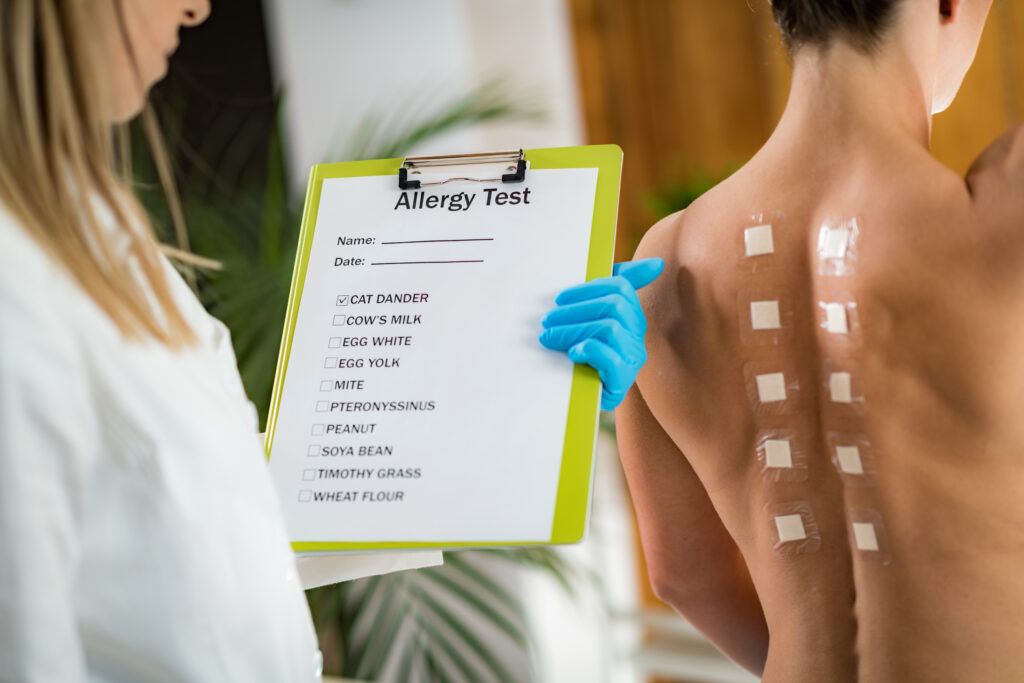Allergies are a fact of modern life.
Allergies are an immune system response to a substance that causes inflammation. The body’s immune system is designed to protect us against foreign substances such as bacteria, viruses, pollen, dust mites, mold spores, and other allergens.
When someone has allergies, their immune system produces antibodies that recognize these substances as “foreign” and attack them. Antihistamines are used to treat allergic reactions.
The most common types of Allergies
• Pollen allergy: This occurs when the person reacts to pollens from grasses or trees. Symptoms include sneezing, itchy eyes, nose, throat, and lungs; coughing; wheezing; difficulty breathing, and watery eyes. People with hay fever can experience symptoms year-round but peak in springtime.
• Food allergy: A food allergy happens when your immune system mistakenly identifies certain foods as harmful and attacks them. Common signs may be hives, itching skin, swelling around the mouth, lips, tongue, or eyes, trouble swallowing, vomiting, diarrhea, abdominal pain, loss of consciousness, shock, and even death. Some people have more than one type of food allergy.
• Drug allergy: When you take medicine for medical conditions like asthma, diabetes, heart disease, high blood pressure, arthritis, migraines, anxiety, depression, cancer, HIV/AIDS, etc., there is always some risk of developing a drug reaction. If you create any rash, itchiness, burning sensation, tingling, numbness, redness, swelling, dizziness, confusion, headache, shortness of breath, chest tightness, palpitations, nausea, vomiting, lightheadedness, fainting, muscle weakness, seizures, hallucinations, coma, or sudden cardiac arrest while taking medication, call 911 immediately
How do they work?
Antihistamine drugs block histamine receptors on cells lining the inside walls of organs throughout the body. Histamine is released by mast cells during an allergic reaction. It triggers nerve signals that cause the muscles surrounding the airways to contract, narrowing the passage between the nostrils and traps allergen particles within the nasal passages. As soon as this begins happening, the brain sends messages telling the respiratory tract to cough up mucus so that it will not get trapped. Once the obstruction clears, normal airflow resumes.
Some antihistamines also affect serotonin levels, thereby reducing excessive sweating associated with emotional stress. In addition, many antihistamines reduce stomach acid production, making digestion easier. These effects make antihistamines helpful in treating colds and u.
Allergic Rhinitis – Causes and Types
Rhinitis means inflammation of the membranes covering the nose. The word rhinitis comes from two Greek words meaning “nose” and “inflammation.” There are four primary forms of rhinitis: pollen-induced, nonallergic, vasomotor, and infectious. Each form affects only part of the nose, although each may occur together.
Pollen Induced Rhinitis
This is usually triggered by airborne allergens such as tree, grass, weed, mold spores, ragweed, dust mites, animal dander, cat hair, cockroach droppings, car exhaust fumes, cigarette smoke, perfumes, cosmetics, insect stings, and other chemicals. Other factors include weather changes, physical activity, exercise, diet, and sleep patterns. Exposure to irritants causes the nasal tissues to swell and become inflamed. Sneezing, runny nose, congestion, postnasal drip, and sinus infections often accompany this condition.
Nonallergic Rhinitis
People who suffer from nonallergic rhinitis don’t produce IgE antibodies against inhaled antigens.
Instead, they react to something else—such as viruses, bacteria, fungi, pollutants, or chemical irritants. Nonallergic rhinitis includes both viral and bacterial infections.
Vasomotor Rhinitis
These cases involve problems with the tiny tubes that carry oxygen through your lungs and into your bloodstream. This type can be brought about by certain foods, medications, alcohol, smoking, poor nutrition, hormonal imbalances, psychological issues, lack of restful sleep, environmental exposures, and even chronic illnesses such as lupus, rheumatoid arthritis, thyroid disorders, and multiple sclerosis.
Infectious Rhinitis
Inflammation occurs when tiny organisms invade human tissue, causing symptoms similar to those seen in hay fever but without any known trigger. Infections caused by streptococci, pneumococcus, mycoplasma pneumonia, chlamydia trachomatis, influenza virus, para influenza three virus, adenovirus, coronavirus, enteroviruses, herpes simplex virus, measles virus, varicella-zoster virus, Epstein-Barr virus, cytomegalovirus, coxsackievirus A9, Staphylococcal spp., Haemophilus influenzae, Neisseria gonorrhoeae, Klebsiella pneumonia, Pseudomonas aeruginosa, Streptococcus pyogenes, Mycobacterium tuberculosis, Antibiotic therapy can treat these types of rhinosinusitis.
Treatment for Allergies
The most effective treatment for allergies involves avoiding triggers and using allergy medication. If you have a severe reaction to an allergen, call 911 immediately. Otherwise, try one of the following treatments:
• Avoidance – Try not to expose yourself to the thing that makes you sneeze or wheeze. For example, if you know you get itchy eyes after being around cats, avoid contact with them.
• Medication – Use over-the-counter antihistamine drugs like Benadryl® or Claritin®, which work best at relieving itching and clearing up mucous secretions. It would be best to take these before going out so you won’t feel sleepy during social situations.
• Immunotherapy – Injectable forms of immunotherapy are available only under prescription; however, oral preparations may help prevent allergic reactions. These medicines contain gradually increasing amounts of allergens. The goal is to build a tolerance to the substance.
• Elimination diets – Some people nd relief from their allergies by eliminating specific food groups from their diet. Others use special dietary supplements designed to block histamines. However, there’s no evidence that either approach works better than avoidance alone.
• Nasal irrigation – Using saline solution helps clear away excess fluids and debris from inside the nose. It also reduces swelling and inflammation. To do this, place a few drops of saltwater on each nostril once every hour while awake. Be sure to rinse thoroughly afterward.
Get yourself examined if you have any allergy consult doctor!

